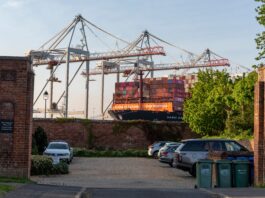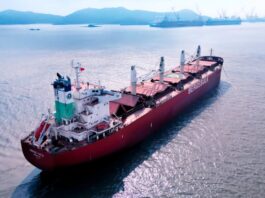The Global Green Shipyard Alliance (GGSA) has been launched by Drydocks World, a subsidiary of UAE logistics major DP World, and includes Germany’s BREDO Dry Docks, Spain’s Astilleros Shipyard Group, and China’s IMC Shipyard Services Group. This coalition will work to accelerate the alignment of shipyard operating practices with international decarbonisation targets.
Shipyards have traditionally operated within national or regional boundaries. Over time, this separation has resulted in significant variations in sustainability initiatives across different jurisdictions, and it is this issue that the GGSA has been formed to address. The international coalition of shipyards aims to do this by increasing the harmonisation of decarbonisation programmes among shipyards globally and encourage the pooling of members’ technical capabilities.
The alliance proposes a coordinated platform for accelerating the deployment of hybrid propulsion technologies, energy-efficiency retrofits, and digital systems for emissions tracking and compliance. Ports, terminal operators, and shipping lines are all under pressure to synchronise their decarbonisation strategies, and shipyards are emerging as a critical link in this chain.
For DP World, the GGSA is part of a wider environmental strategy that includes the other initiatives it supports: the Zero Emission Port Alliance (ZEPA) and the First Movers Coalition. These initiatives aim to reduce the emissions footprint of maritime operations and direct capital towards large-scale infrastructure transformation projects.
Rado Antolovic, CEO of Drydocks World, commented on the formation of the coalition: ‘The formation of the Global Green Shipyard Alliance reflects our shared responsibility to accelerate the maritime industry’s decarbonisation journey. At Drydocks World, we are proud to be a founding member of this important initiative and to collaborate with our global counterparts to advance more sustainable, efficient practices across the sector.’
Standardisation across shipyards could reduce transaction costs for shipowners seeking compliant retrofit services or sustainable newbuild options. This may encourage competition based on decarbonisation performance metrics, rather than cost alone. In terms of investment, alliances such as the GGSA may also function as de-risking mechanisms, offering a more coherent framework for financiers that are interested in supporting low-carbon maritime infrastructure.
To date, the shipyard sector has been behind in terms of emissions abatement innovation relative to other parts of the maritime value chain. The alliance aims to reverse this trend by delivering measurable reductions in lifecycle emissions, establishing clear pathways for technology transfer among its members, and providing transparent emissions reporting.







